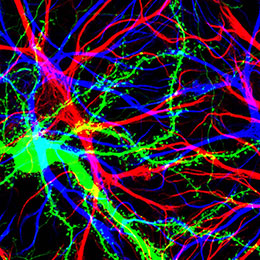The NCCIH Clinical Digest is a monthly e-newsletter that summarizes the state of the science on complementary and integrative health practices for a health condition (diabetes, cancer, sleep disorders, etc.)—clinical guidelines, literature searches, continuing medical education, and information for patients.
In each issue, you'll find evidence-based information for several complementary health practices used for the highlighted condition.
If a friend or colleague has directed you to this resource, we encourage you to subscribe to NCCIH Clinical Digest.
Multiple Sclerosis and Complementary Health Approaches
March 2025
Many people with multiple sclerosis (MS) use complementary health approaches to help reduce relapses or relieve symptoms, such as pain, muscle spasticity, fatigue, problems with cognition, and depression. Some mind and body practices, such as yoga, may help ease some symptoms of MS, but there is currently no definitive evidence to suggest that any dietary supplement is effective to reduce relapses or symptoms of MS.
The American Academy of Neurology issued evidence-based guidelines in 2014 on complementary and alternative medicine use for MS and reaffirmed the guidelines in February 2023. These guidelines concluded that evidence was available to develop practice recommendations for use of cannabinoids, ginkgo biloba, low-fat diet with omega-3 supplementation, magnet therapy, reflexology, and bee venom therapy. This issue of the digest provides the state of the evidence for some of these and other commonly used complementary health approaches for MS as well as others.
- Hepatitis C and Dietary Supplements
- Travel-Related Ailments and Complementary Health Approaches
- Psychological and Physical Practices for Older Adults
- Psychological and Physical Approaches for Substance Use Disorders
- Psychological and Physical Approaches for Sleep Disorders
- High Cholesterol and Natural Products
- Mind and Body Approaches for Stress and Anxiety
- Complementary Psychological and/or Physical Approaches for Cancer Symptoms and Treatment Side Effects
- Arthritis and Complementary Health Approaches
- ADHD and Complementary Health Approaches
- Headaches and Complementary Health Approaches
- Seasonal Allergies and Complementary Health Approaches
- Irritable Bowel Syndrome and Complementary Health Approaches
- Dietary Supplements Marketed for Weight Loss, Bodybuilding, and Sexual Enhancement
- Type 2 Diabetes and Dietary Supplements
- Complementary Health Approaches for Chronic Pain
- Dietary Supplements and Cognitive Function, Dementia, and Alzheimer’s Disease
- Asthma and Complementary Health Approaches
- Music and Health
- Nutritional Approaches for Musculoskeletal Pain and Inflammation
- Benign Prostatic Hyperplasia and Complementary and Integrative Approaches
- Depression and Complementary Health Approaches
- Mind and Body Practices for Fibromyalgia
- Skin Conditions and Complementary Health Approaches
- Complementary Health Approaches for Hypertension
- Autism Spectrum Disorder and Complementary Health Approaches
- Menopausal Symptoms and Complementary Health Approaches
- Complementary Health Approaches for Smoking Cessation
- The Common Cold and Complementary Health Approaches
- Anxiety and Complementary Health Approaches
- Yoga for Health
- Mind and Body Approaches for Chronic Pain
- Spotlight on Saw Palmetto
- Seasonal Affective Disorder and Complementary Health Approaches
- Massage Therapy for Health
- Use of Yoga, Meditation, and Chiropractic by Adults and Children
- Use of Natural Products by Children
- Parkinson’s Disease and Complementary Health Approaches
- Children’s Use of Complementary Health Approaches
- Mind and Body Approaches for Health Problems in Military Personnel and Veterans
- Myth-Busting Popular Natural Products Marketed for Disease Prevention and Wellness